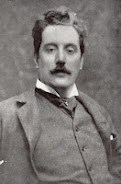A memorable lesson of singing
At that time, the author was 38 years old, and three years earlier he had premiered with great success Manon Lescaut (1893). Later came Tosca (1900), Mme Butterfly (1904), and Turandot (unfinished, 1926), among others.
La Boheme portrays a group of artists who survive in the Latin Quarter of Paris, around 1830, sacrificing their lives for art.
Much of the work is original, but the basic idea originates in the serialized novel (or collection of vignettes, rather) "Scenes of Bohemian Life" by French writer Henry Murger, published in a newspaper over five years in the middle of the century.
Four artists make up the group of bohemians, each with his intellectual restlessness: Rodolfo is a poet; Marcello is a painter; Colline studies philosophy; Schaunard is a musician. They live in a garret in a building in the Latin Quarter. They are joined by the singer Musetta, and a fragile and naive seamstress named Mimi, who lives in the same building.
 |
| Giacomo Puccini (1858 - 1924) |
They have found love. Both sing the duet that Rodolfo begins with the words O soave fanciulla (Oh, sweet girl), confessing their newfound love to each other. Thus, in love, they will join the group of friends. They leave the room. The last bars are sung offstage, magnificently.
The rendition is by Renata Scotto and Luciano Pavaroti. Met, 1977.
